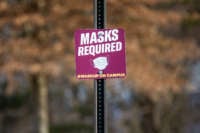
A team of seasoned election auditors has challenged the Republicans leading the Arizona Senate’s inquiries into the accuracy of 2020’s presidential election results to a demonstration where the auditors say that they will conclusively show that Joe Biden beat Donald Trump in Arizona’s most populous county.
The challenge, led by a longtime Republican Party election observer and two technologists familiar with voting systems and vote-counting data, would present the results of every race in any randomly chosen batch of ballots, as generated by Maricopa County’s 2020 election data. Those paper ballots would be hand-counted and compared to the electronic totals to attest to the election’s results. These paper and digital records are the building blocks of the county’s voting system.
“We now have the capability to determine the ballot count and vote results for all of the elections on any batch and any box of ballots that were delivered to the [Senate’s contractor, Florida-based Cyber] Ninjas under the [Senate’s] subpoena, without ever looking at a single ballot,” Tucson’s Benny White, a longtime election observer for the Arizona and Pima County Republican Parties, wrote on June 8 in a letter to Arizona Senate President Karen Fann and the audit liaison and former Secretary of State Ken Bennett. Fann and Bennett are Republicans.
“Our proposal will be for the Ninjas to select any unopened box of ballots, provide us with the box number from the label on the outside of the [storage] box and we will produce the results from the public record,” White said. “The Ninjas could then count all of the votes on all of the races on all of the ballots in that box, then we could compare the results.”
The auditors are seeking to confront and upstage the Senate’s pro-Trump contractors whose hand count and related examinations of 2.1 million paper ballots in Phoenix’s Veterans Memorial Coliseum may wrap up by mid-June. The contractors have not yet issued any report or preliminary findings as of June 9, although there is an expectation in pro-Trump circles that their findings will cast doubt on the election’s outcome. Pro-Trump lawmakers, candidates and activists have been visiting the arena.
The Senate’s investigations, nonetheless, have been widely criticized as partisan and amateurish by experts in election administration and policy circles. But its defenders, including Bennett, have said that most Arizona Republicans wanted to see more evidence than the state’s official post-election audits have provided.
Bennett did not immediately respond to a request seeking a comment on the auditing team’s challenge.
In late May, the same team of independent auditors — comprised of White, who has been a Republican Party election observer for years and served on Arizona’s Elections Procedures Manual Revision Committee; Larry Moore, the retired founder and CEO of Clear Ballot, a federally certified audit firm; and Tim Halvorsen, the retired chief technology officer of Clear Ballot — reported that their initial analysis of Maricopa’s 2020 election data found about 60,000 ballots with votes for a majority of the Republican candidates but not for Trump. They also found about 40,000 ballots with most votes for Democrats and for Trump.
Their findings suggested that suburban Republicans rejected Trump, which helped to elect Biden. In Maricopa County, home to Phoenix and 60 percent of Arizona’s 2020 electorate, Biden beat Donald Trump by 45,109 votes. Statewide in Arizona, Biden won by 10,457 votes.
The auditors’ efforts stand out because apart from state and local election officials defending the accuracy of Arizona’s 2020 election results — and Senate contractors investigating the same election — it appears that nobody else with election auditing experience has obtained the official vote count records from Maricopa County and investigated and sought to publicly verify Biden’s state-certified victory.
White told Voting Booth that he has been deeply troubled by Trump’s and his allies’ attacks on election officials, voting technology, and the rules of voting, all of which have undermined public confidence in elections.
At first glance, their challenge may appear to be an attempt at election theatrics that seeks to blunt another spectacle — the nearly two-month-long inquiries inside Phoenix’s old pro-basketball arena. But the challenge is brought by critics who say that they have accomplished what the Senate’s inexperienced contractors have so far failed to do, which is use official election records to confirm that the county’s electronic tally matched its paper ballots. The contractors have been struggling with the official vote count data, well-placed insiders have told Voting Booth.
Thus, despite millions spent on high-definition cameras and microscopes for scanning ballots and other equipment in the Phoenix arena, which has created made-for-TV optics that have been praised by right-wing media and Trump supporters visiting from other states, the contractors have been struggling to parse the building blocks of the official results — which are key baselines for any legitimate assessment of the outcome’s accuracy.
For example, every paper ballot is scanned to start the counting process. A digital image is created that gets analyzed by software that detects votes and compiles a table of those results. Those tables are built into an overall spreadsheet of results, called the cast vote record. The Senate’s contractors have not looked at any ballot images, insiders have told Voting Booth. They also have been struggling with the cast vote record, according to others who have been talking with the contractors.
By contrast, the seasoned auditors want to use the cast vote record to make their case by saying what the results are in any randomly selected batch of ballots — and then counting those ballots by hand to affirm the voting system’s accuracy.
“There were 10,341 total batches of ballots counted in the Maricopa County 2020 General Election; most batches contain about 200 ballots. What if I could show the count of votes for every candidate in every race on any number of selected batches — without ever opening a box or touching a ballot?” their June 8 letter to Fann and Bennett began. “At a minimum, this would conclusively dispel the growing allegations that the critical file, the Cast Vote Record, may be corrupted. The official results are derived from this file.”
“We have analyzed official public records from Maricopa County’s 2020 General Election,” the challengers’ letter continued. “We have debunked the allegation that 40,000 ballots were dumped into the count by reconciling the voted file and certified canvass against the voter registration file. We have carefully analyzed the official Cast Vote Record to find: (1) the Record is complete and accurate and (2) President Trump lost Maricopa County due to the fact that disaffected Republican supportive voters did not vote for him and (3) the disaffection was widespread across all precincts in Maricopa County.”
White said that he had not received a reply from Fann or Bennett. Meanwhile, other critics of the Senate’s inquiries said that it was time for the Arizona Senate to conclude the exercise and the election’s losing side to accept the result.
“[B]y overstating its capabilities, the vendor Cyber Ninjas has let down Arizona Senate Republicans,” wrote longtime Republican election lawyer Ben Ginsberg in an Arizona Republic commentary. “Their haphazard procedures have turned the Audit into the ‘audit’ and their findings won’t be credible, whether they deem the election flawed or not… [T]hey are at the helm of a fatally tainted audit.”
“When is this going to end?” asked David Becker, the executive director of the nonprofit, nonpartisan Center for Election Innovation and Research. “There is no amount of facts that will convince people who are living in another reality… The outcome of the election has already been confirmed. What are we doing here?”
This post was originally published on Latest – Truthout.













 LISTEN! Today, the GOP once again screamed the quiet part out loud—this time before
LISTEN! Today, the GOP once again screamed the quiet part out loud—this time before 